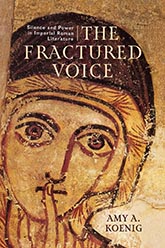|
The Fractured Voice
Silence and Power in Imperial Roman Literature
Amy A. Koenig
Wisconsin Studies in Classics Imprint
“Pulling together a dizzying array of materials and concepts from disparate fields, The Fractured Voice is a transformative study of speech in the ancient world. Impressive scholarship supports an adroit, wholly original, and convincing argument that avoids the previous, reductive approaches to the motif of speech loss in Roman literature.”
—Bartolo Natoli, author of Silenced Voices: The Poetics of Speech in Ovid
Imperial Rome privileged the elite male citizen as one of sound mind and body, superior in all ways to women, noncitizens, and nonhumans. One of the markers of his superiority was the power of his voice, both literal (in terms of oratory and the legal capacity to represent himself and others) and metaphoric, as in the political power of having a “voice” in the public sphere. Muteness in ancient Roman society has thus long been understood as a deficiency, both physically and socially.
In this volume, Amy Koenig deftly confronts the trope of muteness in Imperial Roman literature, arguing that this understanding of silence is incomplete. By unpacking the motif of voicelessness across a wide range of written sources, she shows that the Roman perception of silence was more complicated than a simple binary and that elite male authors used muted or voiceless characters to interrogate the concept of voicelessness in ways that would be taboo in other contexts. Paradoxically, Koenig illustrates that silence could in fact be freeing—that the loss of voice permits an untethering from other social norms and expectations, thus allowing a freedom of expression denied to many of the voiced.
 Amy A. Koenig is an assistant professor of classics at Hamilton College.
Amy A. Koenig is an assistant professor of classics at Hamilton College.
Praise
“Koenig brings a fresh perspective to the understanding of silence in the culture of the Roman empire, showing that loss of voice can unlock new possibilities of expression that allow the mute person to signify facts and feelings otherwise difficult or dangerous to communicate. Those interested in Roman literature, cultural history, and disability studies stand to learn a great deal from this book.”
—Silvia Montiglio, author of Silence in the Land of Logos
Table of Contents
Contents
Acknowledgments
Introduction: The Tongueless Nightingale
Chapter 1. The Embodied Voice: Conflict and Constraint in Galen’s Writings
Chapter 2. The Mute Goddess: Speechlessness, Divinity, and Power in Ovid’s Fasti
Chapter 3. The Dancer’s Silence: Ovidian Myths of the Voice and Roman Pantomime
Chapter 4. The Instrument of the Voice: Body, Mind, and Music in the “Second Sophistic” Greek Novels
Chapter 5. Nova vox: (Re)gaining a Voice in the Ass Novels
Epilogue: Mea lingua Christus: Muteness and Martyrdom
Notes
References
Index
|

Larger images
January 2024
228 pp. 6 x 9
|

